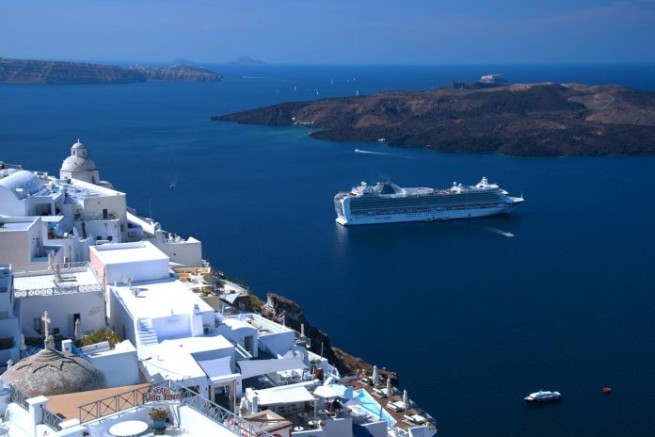On April 21, 1941, Greece surrendered to Nazi Germany. The act of surrender was signed by General Georgios Tsolakoglu, who did not have the authority to do so from the government. In gratitude, the Nazis appointed him prime minister. While the Germans were celebrating an easy victory, British troops were urgently loaded onto ships to evacuate Greece.
Before World War II, Greece was a backward, predominantly agrarian country. The industry was dominated by small enterprises for the processing of agricultural raw materials. At the same time, the merchant fleet was well developed. Foreign trade occupied the most important place in the economy. Greece exported tobacco, olive oil, raisins and minerals.
The government of General Ioannis Metaxas, which was in power, pursued a policy of economic and political rapprochement with Nazi Germany. In 1939, she already ranked first in the Greek foreign trade turnover.
After the outbreak of war in Europe, the Greek government declared neutrality.
However, after the surrender of France on June 22, 1940, the Italian fascist leader Benito Mussolini began to prepare an attack on Greece. On October 28 of the same year, the Italian government presented the Greek authorities with an ultimatum demanding that Italian troops be allowed through to all strategic points and naval bases. Without waiting for an answer, the Italians bombed the railways, ports and airfields of Greece.
The weak preparation of Greece for the war allowed the Italian troops at first to seize part of the Greek territory. The actions of the fascists, however, mobilized broad masses for resistance. The British, who provided the Greeks with their fighters, fulfilled their allied obligations.
In November 1940, in the Pindus mountains, Mussolini’s army was severely defeated, after which it had to retreat outside Greece. However, a new danger looms over Greece. Adolf Hitler viewed the Balkan Peninsula as a springboard for a future war with the USSR and for establishing control over the entire Mediterranean. In addition, the Nazis needed a campaign against Greece to deliver a powerful blow to British troops.
The operation of the Wehrmacht forces to invade the southernmost country of the Balkan Peninsula was named “Marita” and was being prepared for three months. Premier Metaxes had died by that time from pharyngeal cellulitis. He was succeeded by Alexandros Korizis. Faced with a real threat, he was ready to accept any help. To maintain the prestige and credibility of Great Britain, Winston Churchill ordered three divisions to be sent to Greece. British generals, however, did not believe that the expeditionary force would be able to hold back the German advance. The 58,000 contingent ended up being more than half of Australians and New Zealanders. It was commanded by Maitland Wilson.
“The Greek adventure was presented to many high-ranking British officers as a“ second Norway ”. The junior officers of the Australian and New Zealand units, assigned for the landing in Greece, enthusiastically studied the maps of the Balkans, drawing up plans for an offensive through Yugoslavia with the subsequent capture of Vienna, ”noted British historian Anthony Beevor.
Germany attacked Greece on the same day as Yugoslavia – April 6, 1941.
While nearly 500 Luftwaffe aircraft were bombing Belgrade, the German ambassador in Athens informed Korisis of the Wehrmacht’s invasion of Greece due to the presence of British troops on its territory. The Greek prime minister replied that his country would defend itself.
“Better to die,” Korisis said to the German ambassador.
Against 430 thousand soldiers and officers of the Greek army and the British corps, Germany put up a group of 680 thousand people.
“With the first rays of the sun, the artillery opened fire. Powerful fireworks. Bombs began to fall. The thought starts to creep into my mind, are we not flattering the Greeks with such a powerful blow, ”wrote the German General of Aviation Wolfram von Richthofen in his diary.
Hitler wanted to cut off the British Expeditionary Force in Greece from the main forces and destroy it. However, radio intercepts made it possible for the British commanders on the front line to receive all information about the plans of the Wehrmacht. A negative psychological impact on the Greeks and the British had the rapid defeat of the Yugoslav army, in the ranks of which only the Serbs put up decisive resistance, and the Croats and Macedonians surrendered en masse at the first opportunity.
In turn, the Greeks stubbornly defended themselves at the border of Bulgaria, from the territory of which the Germans were moving. After several days of stubborn fighting, the Wehrmacht units managed to break through the front through the southeastern tip of Yugoslavia. On April 9, 1941, the Germans approached Thessaloniki. On April 11, a major battle took place between the SS Adolf Hitler division and the British tankers. And yet the overall picture was in favor of Germany. The British had to retreat through the mountain passes. Tanks and trucks were hurriedly thrown or destroyed. Together with the British and Greeks, the defeated Yugoslavs left through Greece. Troop columns making their way south to the Peloponnese were raided by the Luftwaffe. At that time, the Messerschmitt aircraft under the command of General Richthofen outplayed the squadrons of the Royal Air Force. The same German pilots who were shot down faced extremely cruel treatment of the Greek peasants.
“In the congestion of military trucks and armored vehicles, one could see a wealthy Belgrade play-through in breathtaking shoes driving an open two-seater Buick, and even with a mistress. One English officer, seeing “a squadron of Serbian lancers in long-brimmed capes passing in the moonlight, looking like the ghosts of knights who had lost a battle,” decided that he was just dreaming about it, “stated the historian Beevor.
British soldiers destroyed bridges and railways behind them.
On April 17, 1941, Yugoslavia surrendered. And on the 18th, after the decision of the Greek government and King George II to evacuate to Crete, and then to the British-controlled Cyprus, Korisis, realizing the doom of Greece, committed suicide.
The new prime minister, Emmanuel Tsuderos, demanded that the army command continue to resist. But among the Greek generals, defeatist sentiments had already developed. The military elite began to put pressure on the government, pushing the ministers to peace negotiations with Germany. There was a military mutiny, as a result of which the commander loyal to the authorities was replaced by General Georgios Tsolakoglu.
On April 21, 1941, in violation of the government’s decision, he signed an act of surrender in Larissa for Greece.
Since Tsolakoglu did not have the legal authority to do this, later the inglorious surrender was not recognized by many Greeks. Despite their defeat in the war with the Greeks, the Italians protested that the surrender was signed without them – and Mussolini, enraged by the “arbitrariness” of the German generals, personally complained to Hitler. The Fuhrer did not refuse his ally, replacing the German representative at the surrender ceremony. The document was revised and re-signed in Thessaloniki on April 23, 1941. 16 Greek divisions laid down their arms.
On April 24, German mountain riflemen took Thermopylae, on the 26th paratroopers captured Corinth, on the 27th German tanks entered Athens. Meanwhile, the British were in full swing evacuating their units from the ports of Attica and the Peloponnese to Crete and Egypt. Loading onto ships took place under bombardment. The losses of the British in killed, wounded and prisoners amounted to 16 thousand people. German aircraft pursued British ships in the Aegean Sea.
On the contrary, the soldiers and officers of the Wehrmacht experienced the morale of an easy victory. One artilleryman wrote to his wife on April 22: “This is a joyful war for us. We are all so tanned and absolutely confident of victory. “
The rolling stock of railways and vehicles was hijacked to Germany, all valuable industrial equipment, the remaining stocks of food and raw materials were removed. Agricultural production fell sharply. The drachma depreciated, speculation flourished, and prices rose dramatically. The result of the German occupation was famine and mass deaths among the population of Greece.
Towards the end of World War II, Hitler admitted that it was the Greek campaign that delayed the start of Operation Barbarossa.
A number of historians are convinced that Operation Marita baffled Joseph Stalin about Germany’s plans. He could have believed that the Germans were preparing to seize the Suez Canal, and not to invade the USSR.
As a reward for the surrender, the Nazis offered General Tsolakoglu the post of prime minister of the collaborationist government. After the liberation of Greece by the Allied forces in October 1944, he was arrested and later sentenced to death for collaboration and treason. The death penalty was eventually replaced by life imprisonment.
Published by Gazeta.ru






More Stories
57 years ago, a junta of black colonels came to power in Greece.
On April 10, 1821, the Turks hanged Patriarch Gregory V at the Phanar gates
How did married couples divorce in Ancient Greece? Difference with modern divorces